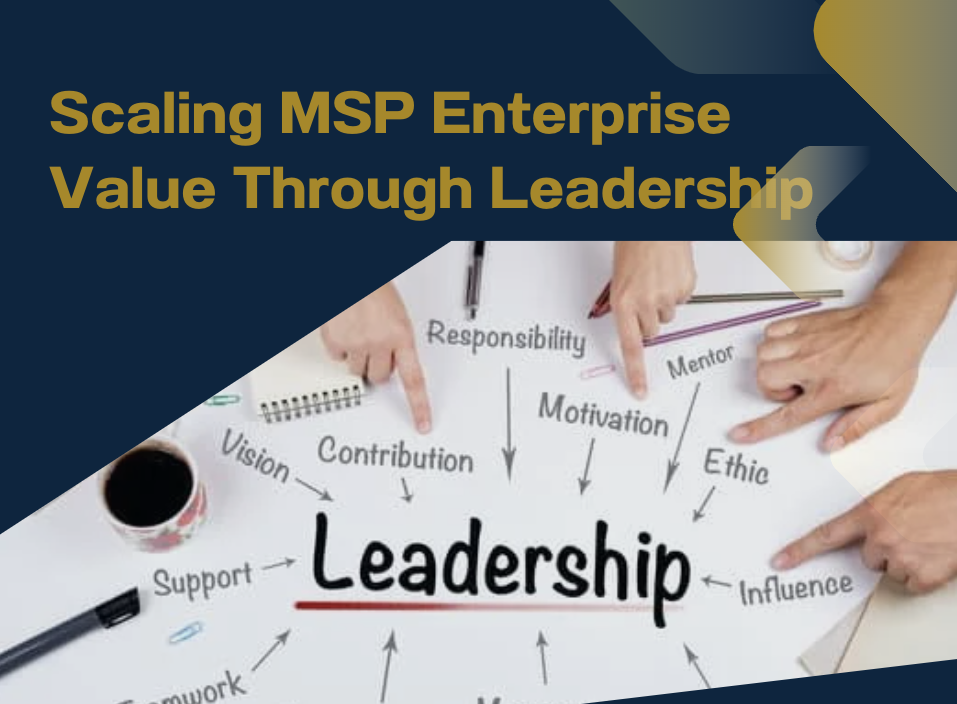As the CEO of a Managed Service Provider (MSP), your role is pivotal in shaping the company’s future. The decisions you make, particularly in the realm of leadership, can significantly impact your enterprise’s value. This guide explores how effective leadership is the cornerstone of sustainable growth and offers strategies to elevate your MSP to new heights.
Understanding the Connection Between Leadership and Enterprise Value
Leadership as the Driver of Growth
In any industry, leadership quality is a decisive factor in a company’s success, but this is especially true in the highly competitive world of MSPs. Strong leaders are not just managers; they are visionaries who steer the organization toward growth, innovation, and market dominance. Their influence is evident in the culture they cultivate, the strategies they implement, and the way they inspire their teams.
Enterprise Value: More Than Just Numbers
Enterprise value encompasses more than just the financial metrics that are often the focus of valuations. It includes intangible assets like brand reputation, customer loyalty, and employee satisfaction—all of which are directly influenced by leadership. A CEO’s ability to articulate a clear vision, foster a culture of continuous improvement, and navigate the company through change can significantly enhance these intangible assets, leading to higher enterprise value.
Strategic Leadership for Long-Term Growth
Building a Visionary Leadership Team
One of the most critical responsibilities of an MSP CEO is to build a leadership team that shares the company’s vision and is capable of driving it forward. This involves not just hiring the right people but also developing existing talent to ensure they can step up as the company scales.
Key Steps:
- Identify Leadership Potential: Recognize individuals within the organization who demonstrate leadership qualities and provide them with opportunities to grow.
- Invest in Leadership Development: Regular training and mentoring programs can help sharpen the skills of potential leaders.
- Promote a Collaborative Culture: Encourage a culture where leaders work together towards common goals rather than in silos.
Strategic Planning for Sustainable Growth
Leadership isn’t just about setting goals; it’s about strategic planning that ensures those goals are met sustainably. Effective strategic planning involves anticipating future challenges and opportunities and positioning the company to respond effectively.
Essential Elements:
- Market Positioning: Regularly assess the market landscape to understand where your MSP fits and how you can differentiate yourself from competitors.
- Scalable Processes: As your MSP grows, ensure that your processes are scalable. This means investing in technology, refining workflows, and standardizing operations.
- Financial Prudence: Maintain a healthy balance between investing in growth and managing costs. Financial stability is crucial for long-term success and enterprise value.
Fostering a Culture of Innovation
Innovation is the lifeblood of any MSP looking to stay ahead in a rapidly evolving industry. As a CEO, it’s your job to foster a culture where innovation is encouraged and rewarded.
Strategies to Encourage Innovation:
- Empower Teams: Give your teams the autonomy to experiment with new ideas and approaches. This can lead to breakthroughs that drive growth.
- Continuous Learning: Encourage continuous learning and development, ensuring your team stays ahead of industry trends and technologies.
- Customer-Centric Innovation: Focus innovation efforts on solving customer pain points. This not only adds value to your services but also strengthens customer loyalty.
Leading Through Change
The MSP industry is characterized by rapid changes in technology, customer expectations, and competitive dynamics. Effective leadership requires the ability to navigate these changes and guide the company through periods of transition.
Managing Change Effectively:
- Communicate Clearly: Transparent communication during times of change is crucial to maintaining trust and morale.
- Adaptability: Be open to revising strategies as new information and challenges arise.
- Stakeholder Engagement: Involve key stakeholders in the change process to ensure buy-in and support.
Measuring Leadership’s Impact on Enterprise Value
Quantitative Metrics
- Revenue Growth: Track how leadership decisions are contributing to revenue growth over time.
- Customer Retention Rates: High customer retention is often a sign of effective leadership and a strong company culture.
- Employee Turnover: Low turnover rates indicate a positive work environment fostered by strong leadership.
Qualitative Metrics
- Brand Reputation: Regularly assess how your brand is perceived in the market, as this can significantly impact enterprise value.
- Customer Satisfaction: Solicit regular feedback from customers to gauge how leadership is impacting service delivery.
- Innovation Index: Measure the rate of innovation within your company, such as new services launched or processes improved.
Conclusion: Elevating Enterprise Value Through Leadership Excellence
The journey to scaling enterprise value in an MSP is one that requires visionary leadership, strategic planning, and an unwavering commitment to innovation and adaptability. As a CEO, your role in guiding the company through growth phases and market challenges cannot be overstated. By focusing on long-term strategies that foster a strong leadership team, sustainable growth, and a culture of innovation, you can significantly enhance your MSP’s enterprise value.
To achieve these ambitious goals, consider partnering with Gold Team. We specialize in helping MSP leaders reach their full potential through tailored coaching, strategic planning, and ongoing support. Let us help you unlock the full value of your enterprise through effective leadership.
Contact us today to learn how we can assist in your journey to sustainable growth and success.



